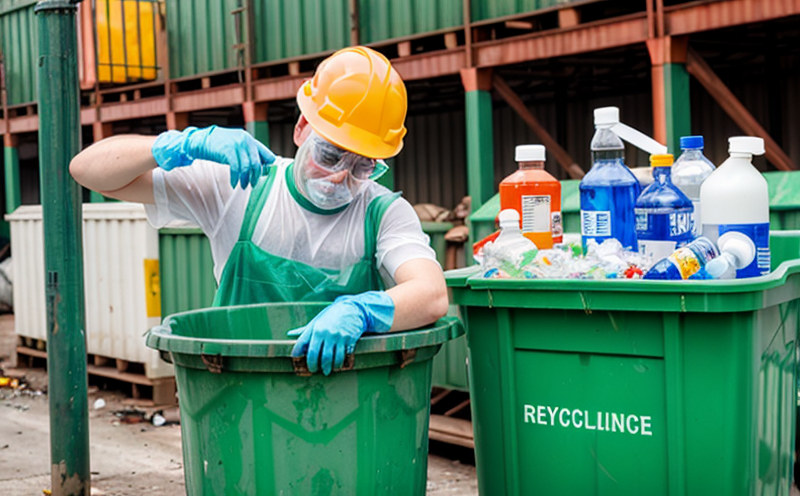UNE EN 13657 Leaching Testing of Solid Waste Samples
The UNE EN 13657 standard provides a comprehensive framework for the leaching testing of solid waste samples. This method is crucial in evaluating the potential environmental impact of various waste materials, particularly those intended for recycling or disposal. The primary goal is to assess whether hazardous substances can leach from the waste into the surrounding environment under specified conditions.
The test involves placing a controlled amount of waste sample in a solution that simulates typical environmental conditions such as rainwater or groundwater. Over time, the solution is analyzed for the presence and concentration of specific chemicals. This process helps regulatory bodies ensure compliance with environmental regulations while also aiding R&D teams to understand material properties more deeply.
One of the key aspects of UNE EN 13657 is its flexibility in accommodating different types of waste materials, from municipal solid waste (MSW) to industrial by-products. The standard’s broad applicability makes it a cornerstone for quality managers and compliance officers working in diverse sectors such as manufacturing, construction, and recycling industries.
The methodology itself requires precise sample preparation, which involves careful weighing and volume measurement of the waste material before placing it into the leaching solution. This step is critical to ensure accurate results that reflect real-world scenarios. Once the test period ends, the solution is filtered and analyzed using various analytical techniques depending on the specific parameters being evaluated.
The UNE EN 13657 standard supports a wide range of industries by ensuring consistent testing protocols across different regions within Europe. This consistency fosters trust among stakeholders and enhances the reliability of environmental assessments conducted by laboratories like Eurolab.
It is important to note that while this standard primarily focuses on leaching tests, it also considers other related factors such as the pH level of the leachate, temperature conditions during testing, and time intervals for analysis. These elements play a significant role in determining the effectiveness of waste management practices.
- The UNE EN 13657 standard is widely recognized for its ability to predict potential risks associated with various types of waste materials.
- It ensures that all testing procedures are conducted under standardized conditions, leading to more accurate and reliable results.
- This standard supports sustainable development by helping identify which wastes pose minimal environmental risk during recycling processes.
Industry Applications
The UNE EN 13657 leaching testing protocol finds extensive application across multiple sectors, including manufacturing, construction, and waste management. Manufacturing companies use this method to evaluate the environmental impact of their products throughout their lifecycle, from raw materials sourcing through end-of-life disposal.
Construction firms benefit significantly by assessing the suitability of recycled aggregates or fillers in concrete mixes using UNE EN 13657 tests. This ensures that these materials do not release harmful chemicals into soil and water during construction projects.
In waste management, this technique is essential for determining whether certain waste streams can be safely reused or if they need further treatment before being reintroduced into the environment. By adhering to UNE EN 13657 standards, facilities demonstrate their commitment to environmental stewardship and regulatory compliance.
R&D departments within these organizations often rely on Eurolab’s expertise in conducting thorough leaching studies according to this standard. Their findings contribute valuable insights into improving product formulations or refining waste treatment processes.
Eurolab Advantages
At Eurolab, our commitment to excellence extends beyond just meeting international standards; we strive to exceed expectations by offering top-tier laboratory services tailored specifically for UNE EN 13657 leaching tests. Our state-of-the-art facilities equipped with advanced analytical instrumentation guarantee accurate and precise results every time.
We employ highly qualified professionals who are trained not only in executing the test procedures but also in interpreting their outcomes correctly. This expertise ensures that clients receive actionable recommendations based on our findings, helping them make informed decisions regarding their waste management strategies.
Additionally, Eurolab offers comprehensive support throughout the entire testing process, from initial consultation to final report delivery. Our experienced team can guide you through every step, ensuring smooth integration into your workflow without disrupting ongoing operations.
Competitive Advantage and Market Impact
The UNE EN 13657 standard has significantly enhanced the competitiveness of businesses operating within regulated industries. Compliance with this international standard demonstrates a company’s dedication to environmental responsibility, which appeals to eco-conscious consumers and investors alike.
- By adhering strictly to these guidelines, companies can avoid costly penalties associated with non-compliance.
- This standard also fosters innovation by encouraging continuous improvement in waste management practices.
- It enhances brand reputation by showcasing a commitment to sustainability and ethical business operations.





